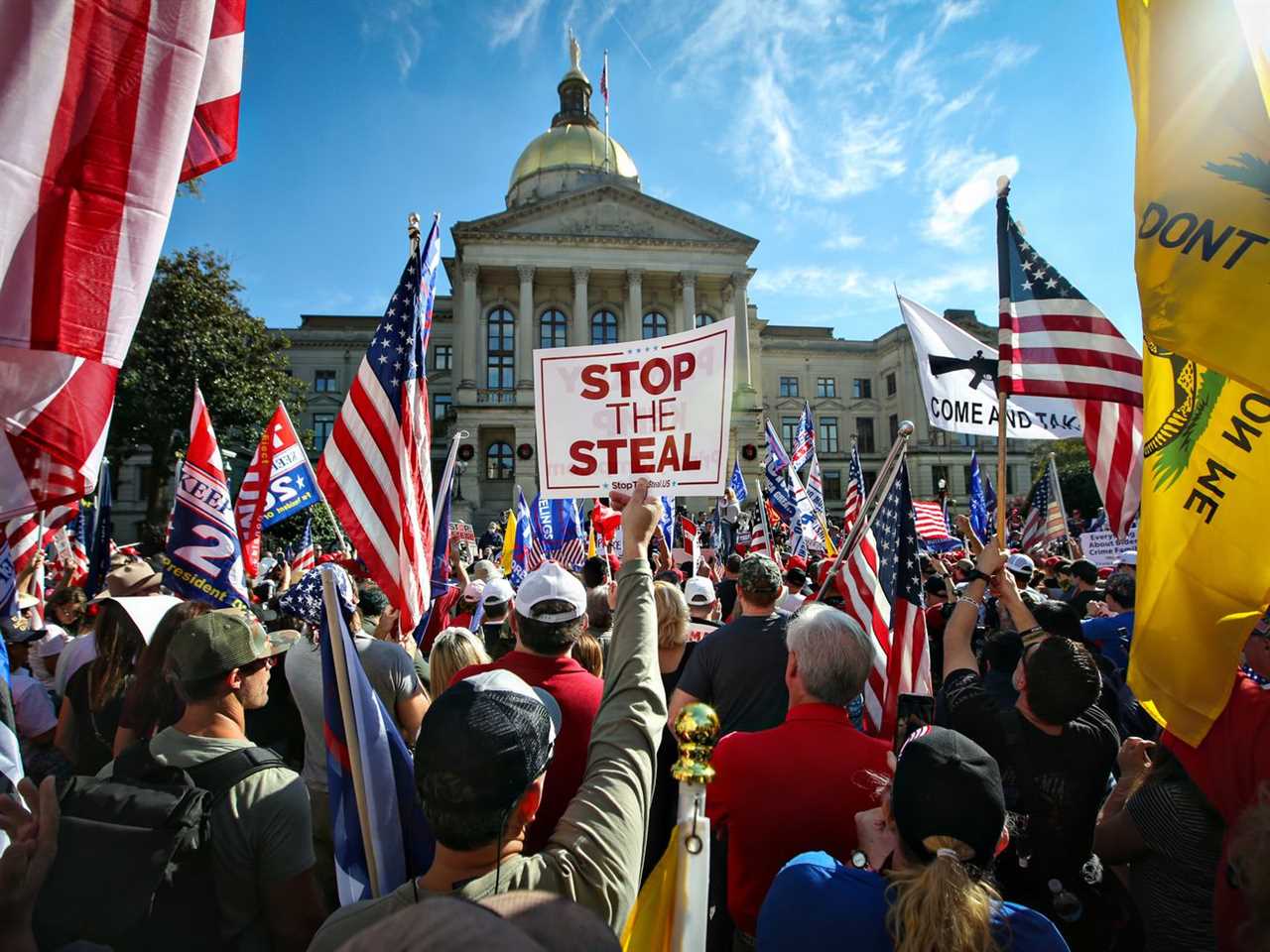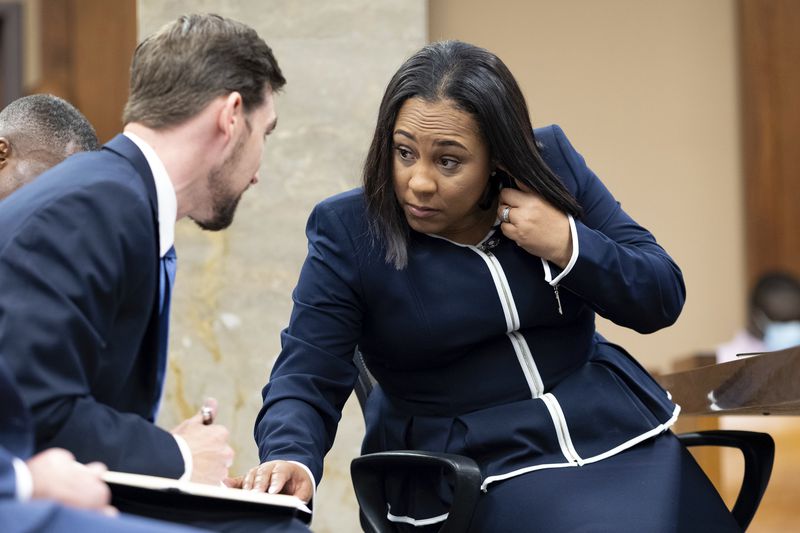
A grand jury investigation in Georgia intensified this summer, and could be a greater legal threat to Trump than the Justice Department.
While the congressional committee investigating January 6 has been holding public hearings and the Justice Department has been steadily securing convictions of hundreds of those who breached the Capitol, a grand jury in Atlanta has been meeting behind closed doors to focus on efforts by former President Donald Trump and his allies to reverse Joe Biden’s election win in Georgia.
That Georgia investigation intensified this summer, drawing closer to Trump’s inner circle and potentially posing a clearer legal threat to Trump than the other probes into his campaign to overturn the 2020 presidential election that culminated in the January 6 attack on the Capitol.
Here’s what you need to know about it.
How did this investigation get started, and who is running it?
The special grand jury was convened in May at the request of Fani Willis, the district attorney for Fulton County, which includes Atlanta, and she’s leading it. It will aid the ongoing investigation launched by Willis in February 2021 into the conduct of Trump and his allies in the aftermath of the 2020 election.
“This is an investigative grand jury, which is slightly different from a regular grand jury that would hear every felony under the sun,” Tamar Hallerman, a reporter for the Atlanta Journal-Constitution who has been focused on the investigation, told Vox earlier in July. “It is focused on this one exclusive case. The whole idea is that they really can become experts and do a deep dive on everything to overturn Georgia’s election results.”
Special grand juries are relatively rare in Georgia and often used in intensive, long-lasting investigations such as this one into the effort to overturn the presidential election in Georgia.
Willis is a first-term district attorney who was elected in Georgia’s largest jurisdiction as a Democrat in 2020. She is a career prosecutor who was previously best known for prosecuting educators in Atlanta Public Schools for their role in a scheme to cheat on standardized tests. Willis has also recently received national attention for indicting the rapper Young Thug on an array of gang-related charges.
What is the Georgia grand jury investigating?
The grand jury is exploring whether Donald Trump and his allies violated Georgia state law in their efforts to reverse the former president’s 2020 loss in the state. Those efforts included his notorious phone call on January 2, 2021, with Georgia Secretary of State Brad Raffensperger, in which Trump said he wanted “to find 11,780 votes.”
It also encompasses efforts by the Trump campaign to create a slate of fake electors in Georgia to transmit fraudulent electoral votes to Congress for certification. Last week, Willis sent a letter to all 16 fake electors in the state to inform them they were considered “targets” of the investigation, which means they are being viewed as potential subjects of indictment and not just witnesses. She had previously subpoenaed them in June.
Who has the grand jury heard from so far?
In addition to subpoenaing the fake electors, the grand jury has sought testimony from a wide array of figures ranging from a former publicist for Kanye West, who allegedly tried to pressure an election worker into making untrue claims about voter fraud, to Brian Kemp, the state’s Republican governor, who was the subject of an unrelenting pressure campaign by Trump to take action on his behalf.
Recently, it sought testimony from a variety of figures in Trump’s inner circle, including former New York Mayor Rudy Giuliani and South Carolina Sen. Lindsey Graham.
“This is major,” Hallerman said at the time. “This represents the first time that the DA is piercing the inner orbit of Donald Trump. Previously, she stayed at the state and local level and kept it very Georgia-focused.”

Ben Gray/AP
Both Graham and Giuliani have tried to avoid testifying. Giuliani was ordered by a New York judge to testify in person in August after he failed to show up to a court hearing contesting his subpoena. Graham has been in an ongoing legal fight over whether he can be compelled to testify. As a result, he said on Monday he had yet to be served with a subpoena.
What happens if they find Trump or anyone else committed a crime?
They can charge them with that crime — even if it’s Donald Trump.
“Georgia has a law that prohibits criminal solicitation to commit election fraud [as well as] a racketeering statute in Georgia which is broader than federal racketeering law,” Hallerman said. This creates opportunities for Georgia prosecutors to pursue indictments that would not be possible under federal statutes.
In particular, Trump’s infamous phone call to Raffensperger could be considered solicitation to commit fraud and the state’s racketeering statute could broadly encompass Trump’s coordinated efforts to overturn the 2020 election.
Is this more likely to result in trouble for Donald Trump than the Justice Department investigation?
Possibly, because Willis, as a district attorney with authority to prosecute only under state laws, doesn’t have the same limitations that the DOJ investigators do under federal laws and policies.
She is not bound by DOJ policies about being cautious in pursuing investigations and prosecutions in advance of an election. She also does not carry the same political baggage as Attorney General Merrick Garland, who will ultimately decide whether to prosecute Trump under federal law. Garland was appointed by President Joe Biden, who Trump could face again in 2024. Willis is an independently elected local official.
Even though Garland is looking into whether Trump violated federal law and Willis into whether he violated Georgia law, both can still prosecute Trump and others for the same actions under the dual sovereignty doctrine, which allows both state and federal government to pursue parallel prosecutions for the same act as long as the act is an offense under both state and federal law.
Is this connected to the January 6 committee’s work?
Not technically. The probes are entirely separate. But the events they are investigating are connected, so there is significant overlap in their efforts. Trump’s campaign to reverse the election outcome in Georgia was unsuccessful, and, the committee has argued, that failure led him to a final effort to overturn the election on January 6, 2021.
The committee’s public hearings have disproportionately featured witnesses from Georgia over other similarly situated states. One June hearing almost entirely featured witnesses from Georgia, with Raffensperger and his former top aide Gabriel Sterling appearing on one panel while two former election workers in the state, Shaye Moss and Ruby Freeman, appeared on a second panel in the same hearing.
The Peach State has captured disproportionate attention from the panel both because of the ample evidence of malfeasance — it is the only state where there are phone recordings of Trump pressuring the top election official — and because so many of the figures who resisted the efforts, like Raffensperger and Sterling, were Republicans who actually had voted for Trump.
The evidence unearthed by the committee and revealed publicly is likely to be very helpful to Willis in proving Trump’s state of mind, and that he knew or should have known that he had actually lost the 2020 election.
Has Willis’s investigation faced any major setbacks?
Yes, one arose this week that created legal obstacles and made it easier for the investigation to be viewed as a partisan witch hunt, which could undermine its credibility.
A judge ruled this week that Willis could not go after one of the state’s 16 fake electors. In a ruling, a local county court judge decided Willis could not herself pursue criminal charges against or compel testimony and documents from state Sen. Burt Jones, who is the Republican nominee for lieutenant governor in the midterms. Instead, Willis would have to defer to an independent outside group to appoint another DA to investigate Jones.
The decision came after Willis hosted a fundraiser for Charlie Bailey, a Democratic candidate for lieutenant governor, before his primary runoff, which created too much of a conflict. In the ruling disqualifying Willis, the judge wrote, “an investigation of this significance, garnering the public attention it necessarily does and touching so many political nerves in our society, cannot be burdened by legitimate doubts about the District Attorney’s motives. The District Attorney does not have to be apolitical, but her investigations do.”
What happens next?
The special grand jury can be seated for up to a year under Georgia law. However, it’s unlikely that it will take that long for any charges to be brought. Sending out the target letters to the 16 fake electors is an indication it’s likely that some indictments will come sooner rather than later.
Willis has also signaled her willingness to call Trump before the grand jury, which would almost certainly spur a major legal battle. However, no final decision about compelling testimony from the former president has been reached.
----------------------------------------
By: Ben Jacobs
Title: Georgia’s big Trump election investigation, explained
Sourced From: www.vox.com/policy-and-politics/2022/7/29/23281081/georgia-trump-fani-willis-investigation
Published Date: Fri, 29 Jul 2022 12:30:00 +0000






